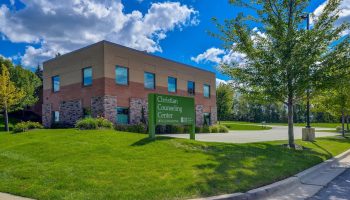About Hope Network Center for Recovery Grand Rapids – Closed
Hope Network Center for Recovery in Grand Rapids, Michigan used to be part of the Hope Network, but has since closed. It specialized in treating professionals, particularly those working in healthcare, through a model of abstinence-based recovery from substance abuse. Various insurance options were accepted, including Medicare and Medicaid.
A Medically Assisted Detox Center East of Lake Michigan
Clients used to be able to access medically assisted withdrawal services here in the facility’s warm, homey detox center. Alongside medical monitoring and medication-assisted treatment (MAT) to help clients manage uncomfortable withdrawal symptoms, mental health and transport services were also available to support participants during this process.
Therapy services were also provided, using styles like cognitive behavioral therapy (CBT), existential therapy, and trauma-informed methods to support clients in their recovery journey. Personalized treatment plans were also used to guide clients’ ongoing treatment schedules.
MAT for Addiction in Northeastern Grand Rapids
MAT was offered at three different locations by this organization, formerly in Grand Rapids and currently in Traverse City and Petoskey.
MAT programming here provided individuals with access to coordinated therapy services, combined with pharmacotherapy for maximum holistic impact. Medications used included buprenorphine and naloxone, and were typically offered as tablets provided on a regular basis by medical providers. These professionals would monitor progress to ensure all withdrawal symptoms were under control.
Individual, group, relational, and family therapy were also provided alongside medical treatment for a more rounded approach to care. Drug screenings, mental health evaluations, and emergency crisis management services were also provided.
Levels of Care
-
Inpatient
Inpatient and residential programs provide round-the-clock medical and emotional support as you live at the treatment facility. This level of care may be recommended if you have severe addictions or mental health conditions since it removes outside distractions and allows you to focus solely on therapy.
-
Outpatient
In outpatient therapy, you’ll attend therapy sessions several times each week while living at home. This is ideal if you have a strong support system and a lower risk of relapse. Outpatient treatment offers flexibility to maintain work, school or family obligations.
-
Aftercare
Aftercare programs provide ongoing support after you complete a rehab program. They may include several components to help you maintain sobriety including therapy, community support groups and relapse prevention strategies. This gives you a network of resources as you reintegrate into your daily life.
-
Dual Diagnosis
Dual diagnosis programs address substance use disorders and co-occurring mental health conditions simultaneously. This integrated approach to care improves the likelihood of long term recovery and stability by addressing the root causes of addiction.
-
Intervention
An intervention is a structured and professionally guided conversation with an individual who is struggling with addiction. During the conversation, family and friends will encourage you to seek treatment. This is often a pivotal step for those resistant to getting help.
-
Sober Living
Sober living homes provide a supportive and substance free environment for you to live in as you overcome your addiction. Residents must follow house rules and support each other's recovery journeys. Sober living fosters accountability and stability during this critical phase of recovery.
Detox Service Setting
-
Inpatient Detox
Inpatient detox occurs in a dedicated treatment facility. You’ll live there around the clock and receive intensive medical support and supervision to help manage your withdrawal symptoms. It is suitable for individuals with moderate to severe addictions as it ensures a stable detox environment.
-
Outpatient Detox
Outpatient detox gives you access to medically supervised withdrawal services while still allowing you to live at home. You’ll attend a clinic for treatment and monitoring. This flexible option is suitable for those with mild to moderate withdrawal symptoms who have strong support systems.
Programs
-
Adult (18+)
Adult programs address the substance use and life challenges specific to adults. Therapists can deliver sessions in individual, group and family settings. Services often include job support and life skills training in a structured environment.
-
Alcohol Detox
Alcohol detox programs offer medical support to help individuals withdraw safely from alcohol. Your care team may use medications to ease your symptoms and provide medical monitoring to address complications.
-
Cognitive Behavioral Therapy
Cognitive behavioral therapy focuses on changing harmful thought patterns and behaviors associated with addiction. You’ll learn healthier coping mechanisms by identifying and replacing negative thoughts. This improves your emotional resilience and decreases your relapse potential.
-
Men
Men's programs address substance use while also considering the social pressures, family roles and mental health concerns that are specific to men. You’ll learn healthy coping mechanisms as you build emotional resilience and develop communication skills.
-
Opioid Detox
Opioid detox uses medications to ease severe withdrawal symptoms. It also includes medical supervision to help you manage potential complications. These services allow you to stabilize and begin a recovery plan.
-
Rational Behavior Therapy
Rational behavior therapy helps you identify irrational beliefs that contribute to an addiction. Challenging and modifying those beliefs helps you develop healthier attitudes and behaviors. This therapy supports long term sobriety and sustainable recovery.
-
Women
Women's programs offer a safe and supportive space to focus on gender specific issues such as trauma, family roles and mental health conditions. Therapists tailor the sessions to address women's needs and foster empowerment in a healing and nurturing environment.
-
Young Adult (18 - 25)
Young adult programs are designed for individuals who are transitioning into adulthood. Topics of discussion typically include identity, independence and peer relationships. Providers may also offer life skills training and career support.
Payment Options
- Medicaid
- Medicare
- Private Insurance
- Self Pay
Accreditations
-
 SAMHSA
SAMHSA
-
 CARF
CARF
Amenities
- Acupuncture Room
- Lakeside
- Private Rooms
- Private Transportation
- Yoga Studio
Contact
3210 Eagle Run Drive Northeast
Grand Rapids, MI 49525




